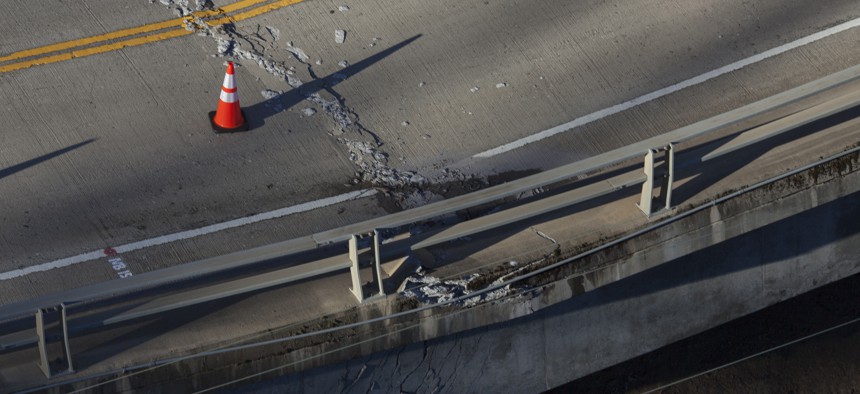Senators Push Boost to Federal Highway Spending

Damage to the Pfeiffer Canyon Bridge on Highway is seen from a helicopter on Monday, March 13, 2017, in Big Sur, Calif. Nic Coury/AP Photo
The proposal from the Senate Environment and Public Works Committee would pay for highway and bridge projects through 2025, but lawmakers have yet to determine a source of funding.
Lawmakers on the Senate Environment and Public Works Committee introduced a surface transportation infrastructure bill Monday that would allocate $287 billion over five years to fix and maintain highways and bridges across the United States.
The legislation would extend funding currently appropriated through the Fixing America's Surface Transportation (FAST) Act, which authorized $305 billion in spending on highways, bridges and other transportation infrastructure and is set to expire in 2020.
The America’s Transportation Infrastructure Act of 2019 would increase spending for highway infrastructure by 27 percent, according to the committee. The bipartisan bill also contains several provisions aimed at addressing climate change.
Negotiations regarding how the infrastructure bill would be paid remain ongoing, but Committee Chairman John Barrasso called the legislation “the most substantial highway infrastructure bill in history.”
“By modernizing our roads and bridges, we can make the roads safer for every family driving on them,” said Barrasso, a Republican from Wyoming. “The bill cuts Washington red tape, so road construction can get done faster, better, cheaper, and smarter.”
The Highway Trust Fund, which is funded through the federal gas tax, is the primary funding source of past infrastructure bills. Revenues have been on the decline as a result of Americans’ increased use of more fuel-efficient cars, but Republicans in Congress remain opposed to raising the federal gas tax. If that holds, lawmakers will need to find new ways to fund infrastructure reauthorization.
The American Social of Civil Engineers began a campaign on Friday pushing for a 25-cent-per-gallon tax increase, which hasn’t been changed since 1993. Other organizations, including the U.S. Chamber of Commerce, have also come out in favor of a gas tax hike.
A spokeswoman said Barrasso plans to meet with Senate Finance Committee Chairman Chuck Grassley to discuss funding options.
“The chairman feels that drivers who use the roads should help contribute to maintain them— including drivers of electric vehicles,” said spokeswoman Sarah Durdaller, adding that Barrasso has already introduced legislation that would require drivers of electric vehicles to pay taxes into the Highway Trust Fund.
Other committees could add additional provisions to the legislation which may increase its total cost.
Without a new funding source, the Congressional Budget Office projects that outlays for the Highway Trust Fund will exceed reserves by $119 billion by 2028. The nationwide investment backlog for transportation funding totals $836 billion in highway and bridge projects and $122 billion in transit projects, experts told the committee at a recent hearing.
Most of the money appropriated through the bill—$259 billion—would be allocated to states through formula grants that automatically apportion funding. About $10 billion in funding would be invested in policies and innovative projects meant to address climate change, including a competitive grant program to build alternative fuel vehicle charging and fueling infrastructure along specific corridors. Other climate initiatives include grants to reduce carbon emissions and relieve traffic congestion.
“This bipartisan legislation includes the first-ever climate title in a highway bill and would invest $10 billion in policies and innovative projects aimed at reducing emissions and enhancing resilience,” said Sen. Tom Carper, the ranking Democrat on the committee.
The legislation also includes provisions to streamline completion of highway projects, establishing a two-year goal for completion of environmental reviews and tracking system to be managed by the Secretary of Transportation for added accountability.
The American Association of State Highway and Transportation Officials said the bill rightly focuses most of the money on formula grants to states, which will ensure state transportation officials will have the flexibility they need to tackle their unique infrastructure needs.
“For state [departments of transportation], it is absolutely crucial to get the next federal transportation bill done on time, without resorting to a series of short-term program extensions,” said Jim Tymon, president of the association.
The committee will mark up the bill Tuesday.
Andrea Noble is a staff correspondent with Route Fifty.
NEXT STORY: A City Seeks to Create a Unique Asset in a 32-Mile River Bike Path





